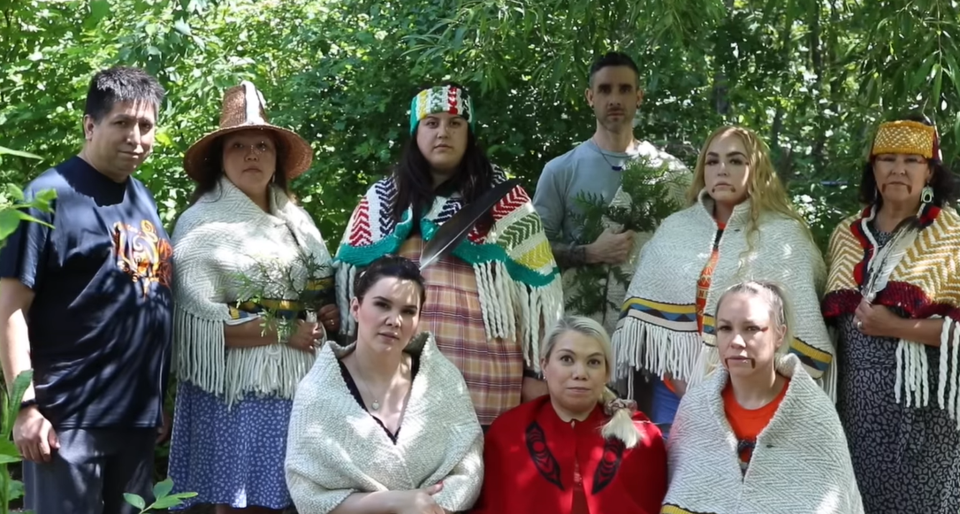“In their silence, they woke the world” – these powerful seven words are spoken at the end of a short video released by the Sḵwx̱wú7mesh Úxwumixw (Squamish Nation) this week to remember the many lives lost and impacted by residential schools.
The moving video comes after Tk’emlups te Secwépemc First Nation Chief Rosanne Casimir shared the heartbreaking news on May 28 that the remains of 215 Indigenous children were found in unmarked graves at the former Kamloops Indian Residential School site.
“To support our people in their grief and promote healing in light of the recent discoveries at former residential schools, the Sḵwx̱wú7mesh Úxwumixw (Squamish Nation) filmed a video response,” Kelley McReynolds, director of Ayás Mén̓men Child and Family Services, the team that produced the video, explained.
“For far too long, these schools taught our children to be ashamed of their culture and language. This video celebrates that we are still here and encourages our people to take comfort and pride in their culture during this difficult time.”
The video shows Indigenous peoples from Squamish Nation and other First Nations communities combined with powerful voiceovers. In just 1 minute and 35 seconds, the video captures poignant thoughts and feelings of Indigenous peoples that send a strong message.
It starts with Jared Van Somer of the Kwadacha Nation, Fort Ware, Prince George, saying, “I am not a footnote in a history textbook.” More voices of First Nations peoples follow, saying: “I am not a mascot. I am not something else. I am not a tourist attraction. I am not a category in the Indian Act. We are not a statistic.
“We are the original caretakers.
"We are still here.
“We are the children and grandchildren of stolen lives. And we will not be buried."
The video ends with Squamish Nation Elder Jackie Gonzales saying, “In their silence, they woke the world" and 215+ appearing on the screen.
The short but impactful video was produced by Ayás Mén̓men team leader and filmmaker Calder Cheverie, along with McReynolds and Hailey Jacobs in youth services, with the support of other team members.
There were 139 residential schools in Canada including 28 in B.C. where thousands of Indigenous children were forced to attend, stripped of their culture and language, and subjected to brutal treatment as part of a program to assimilate them into Canadian society, which began in the late 1800s. It wasn't until 1984 that all residential schools in the province were closed down; the last one in Canada didn't close until 1996.
The Truth and Reconciliation Commission says the exact number of children who died "may never be known, but the death rates for many schools, particularly during times of epidemic or disease, were very high." Through its work with survivors and Aboriginal organizations on the Missing Children Project, the TRC has identified more than 4,100 children who died at institutions across Canada so far.
When the news of the Kamloops discovery broke, calls were heard across Canada for the Federal Government to "urgently act" on the TRC's Calls to Action regarding missing children and burial sites. More specifically, for the expert examination of all residential school sites in Canada for burial grounds and for the creation of a national registry to house the information.
Along with many other Indigenous communities and leaders, both Squamish and Tsleil-Waututh Nations have called on the government to make the actions a priority and to help Indigenous communities complete the important work.
“The video is also a call to action,” McReynolds said. “We as a Nation urge the federal government, all institutions, First Nations leaders, and people of Canada to demand the implementation and completion of all 94 Calls to Action of the Truth and Reconciliation Commission.
“We also call on the government to stop fighting the Canadian Human Rights Tribunal (CHRT) orders to compensate Indigenous children and families who experienced discrimination in the child welfare system, and stop disqualifying Indigenous children from Jordan’s Principle eligibility.”
As June 21 marks National Indigenous Peoples Day the video offers a reminder to take a moment to learn more about the history of Indigenous peoples in Canada.
Watch the video
For immediate assistance to those who may need it, the National Indian Residential School Crisis Line is available 24 hours a day at 1-866-925-4419.
Elisia Seeber is the North Shore News’ Indigenous and civic affairs reporter. This reporting beat is made possible by the Local Journalism Initiative.



